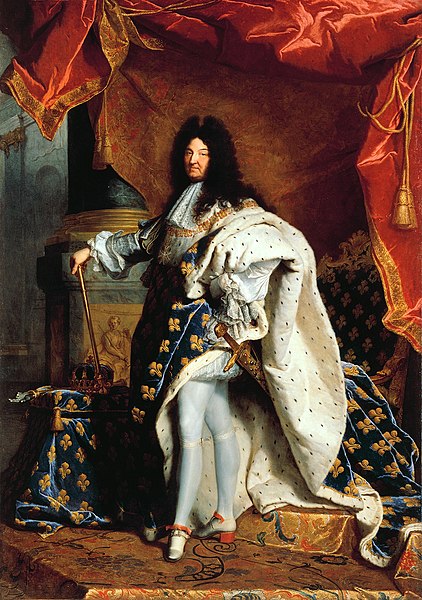 |
| Louis XIV
Author Hyacinthe Rigaud
Source Wikipedia
|
There is a really depressing article by Ed West in The Guardian entitled The long adieu: how Britain gave up learning French. Apparently there has been a sharp decline in the number of British schoolchildren taking modern languages, particularly French. For some reason or other there has been a slight increase in the numbers taking Spanish (which is good) but that does not make up for not doing French. Spanish has never been spoken in these islands whereas French was. As West notes, it is
"the language used at the first parliament, spoken at Runnymede in 1215, a language that still features in much of our legal system and which, until 1858, was the only one on British passports."That is the reason why our vocabulary is so huge and flexible and our grammar so simple. Without the Norman conquest English could well have developed into an inflected language, much like modern German, with genders and awkward compound words.
But there is another reason for learning French which is that seventeenth and eighteenth century France shaped the modern world in science, diplomacy and of the course the arts. That is particularly true of ballet. Just go through Wikipedia's glossary of ballet terms and count the number that are not in French. As David Bintley reminded us in his documentary, The King who invented Ballet there is a reason for that. The company of the Paris Opera and the school that is attached to it are the oldest and arguably noblest in the world.
A generation ago it would not have been necessary for teachers to explain what is meant by tendu, fondu or frapper. The class would have come across those words in their unseens and prose composition. Increasingly in class I am instructed to bend rather than plier or to tap rather than piquer. Plier means to fold rather like a pantograph and piquer means to prick which are subtly different concepts from bending or tapping which would translate into rather different movements.
World Ballet Day starts with class in each of the companies. The ballet master or mistress may give instructions in Russian, English or some other language but the exercise itself is nearly always described in French and its meaning instantly becomes clear. The use of French was never abandoned in the Soviet Union even at the height of Stalin's terror and it would have been one of the few conduits with the rest of the world. It provided a medium through which other ideas could pass. Without such conduit would perestroika ever have been possible?
As machine translation improves, as English is spoken everywhere a tourist goes as many businesses and institutions even in France use English internally it is argued that there are better uses of time on a crowded curriculum - but are there. We don't learn French to order a pression or croque Monsieur but to understand our own language and civilization better. If we drop French we do so at our peril.

King Louis 14th created founding of Paris ballet in 1661. Oldest ballet in world
ReplyDeleteKing Louis 14th created founding of Paris ballet in 1661. Oldest ballet in world
ReplyDelete